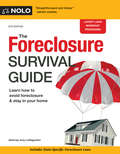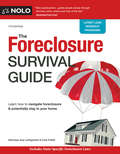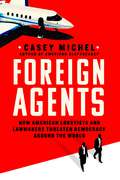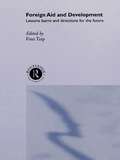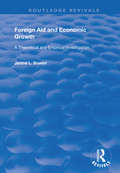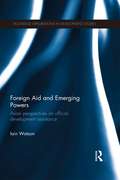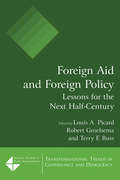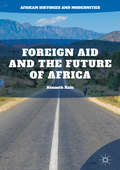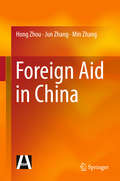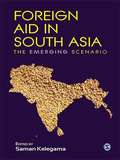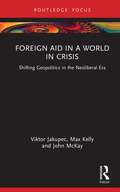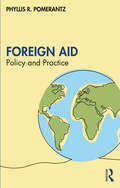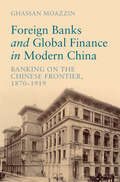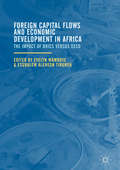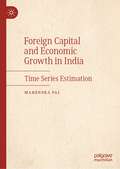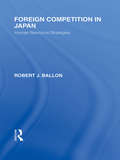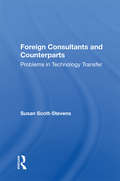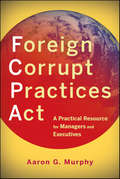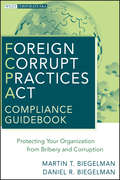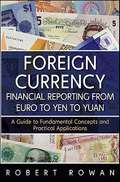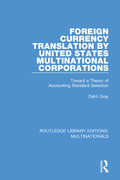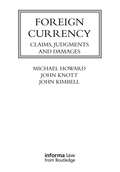- Table View
- List View
Foreclosure Survival Guide, The: Keep Your House or Walk Away With Money in Your Pocket
by Amy LoftsgordonIf you're one of the millions Americans who are having trouble making your mortgage payments or are already in danger of foreclosure, this guide will give you the practical information you need, including: the ins and outs of foreclosure how to decide if you should try to keep your house federal programs to help you avoid foreclosure alternatives to foreclosure, such as short sales and deeds in lieu delaying or avoiding foreclosure with bankruptcy, and avoiding foreclosure scams. This edition of the nation's bestselling book on foreclosure is updated with the latest information on the federal Making Home Affordable programs, federal mortgage servicing rules, recent court decisions affecting homeowner?s rights, and state foreclosure procedures and timelines.
Foreclosure Survival Guide, The: Keep Your House or Walk Away With Money in Your Pocket
by Amy LoftsgordonIf you're having trouble making your mortgage payments or are already in danger of foreclosure, this guide will give you the practical information you need, including: the ins and outs of foreclosure how to decide if you should try to keep your house programs to help you avoid foreclosure alternatives to foreclosure, such as short sales and deeds in lieu delaying or avoiding foreclosure with bankruptcy, and how to avoid becoming the victim of a foreclosure scams. This edition is updated with the latest information on federal mortgage servicing laws, programs to help homeowners avoid foreclosure, relief for victims of natural disasters, recent court decisions affecting homeowners’ rights, and state foreclosure procedures and timelines.
Foreign Agents: How American Lobbyists and Lawmakers Threaten Democracy Around the World
by Casey MichelA stunning investigation and indictment of a segment of the United States' foreign lobbying industry, and the threat to end democracy.For years, one group of Americans has worked as foot-soldiers for the most authoritarian regimes around the planet. In the process, they've not only entrenched dictatorships and spread kleptocratic networks, but they've secretly guided U.S. policy without the rest of America even being aware. And now, some of them have begun turning their sights on American democracy itself.These Americans are known as foreign lobbyists, and many of them spent years ushering dictatorships directly into the halls of Washington, all while laundering the reputations of the most heinous, repressive regimes in the process. These foreign lobbyists include figures like Ivy Lee, the inventor of the public relations industry—a man who whitewashed Mussolini, opened doors to the Soviets, and advised the Nazis on how to sway American audiences. They include people like Paul Manafort, who invented lobbying as we know it—and who then took his talents to autocrats from Ukraine to the Philippines, and then back to the White House. And they now include an increasing number of Americans elsewhere: in law firms and consultancies, among PR specialists and former lawmakers, and even within think tanks and universities.In Foreign Agents, Casey Michel shines a light on these foreign lobbyists as some of them—after decades of installing dictators and corrupting American policy—embark on their next mission: to end America’s democratic experiment, once and for all.
Foreign Aid and Development: Lessons Learnt and Directions For The Future (Routledge Studies In Development Economics Ser. #Vol. 17)
by Finn TarpPeter Hjertholm, Editorial Assistant Aid has worked in the past but can be made to work better in the future. In this important new book, leading economists and political scientists, including experienced aid practitioners, re-examine foreign aid. The evolution of development doctrine over the past fifty years is critically investigated, and conven
Foreign Aid and Economic Growth: A Theoretical and Empirical Investigation (Routledge Revivals)
by Janine L. BowenPublished in 1998, this book provides an empirical analysis of the impact of foreign economic aid in 67 developed countries over a 19 year period. The results include the relationships between aid and growth and the implication that methodologies traditionally used have been largely responsible for inconsistent findings in the past.
Foreign Aid and Emerging Powers: Asian Perspectives on Official Development Assistance (Routledge Explorations in Development Studies)
by Iain WatsonCurrent debates on emerging powers as foreign aid donors often fail to examine the myriad geopolitical, geoeconomic and geocultural tensions that influence policies of Official Development Assistance (ODA). This book advocates a regional geopolitical approach to explaining donor-donor relationships and provides a multidisciplinary critical assessment of the contemporary debates on emerging powers and foreign aid, bringing together economic and geopolitical approaches in the light of the 2015 completion of the Millennium Development Goals (MDGs). Moving away from established debates assessing the advantages and disadvantages of foreign aid, this book challenges the current geopolitical assumptions of the emerging powers concerning issues such as 'south-south' solidarity, shared development experience and 'multipolarity'. It analyses how donor governments 'sell' aid to recipients through enabling different cultural assumptions and soft power narratives of national identity and provides empirical evidence on agendas such as aid effectiveness, aid for trade, public-private partnerships, and green growth aid. The book examines the role of, and relationships between, the leading traditional and emerging power Asian donors specifically, and explores the different and contested perspectives and patterns of ODA policy through an alternative account of emerging power foreign aid to leading African and Asian recipients. This book provides a valuable resource for postgraduate students and practitioners across disciplines such as development economics and geopolitics of development, uniquely approaching the debate from the perspective of emerging powers and donors.
Foreign Aid and Foreign Policy: Lessons for the Next Half-century (Transformational Trends In Governance And Democracy Ser.)
by Terry F. Buss Louis A. Picard Robert GroelsemaThis timely work presents cutting-edge analysis of the problems of U.S. foreign assistance programs - why these problems have not been solved in the past, and how they might be solved in the future. The book focuses primarily on U.S. foreign assistance and foreign policy as they apply to nation building, governance, and democratization. The expert contributors examine issues currently in play, and also trace the history and evolution of many of these problems over the years. They address policy concerns as well as management and organizational factors as they affect programs and policies. "Foreign Aid and Foreign Policy" includes several chapter-length case studies (on Iraq, Pakistan, Ghana, Haiti, and various countries in Eastern Europe and Africa), but the bulk of the book presents broad coverage of general topics such as foreign aid and security, NGOs and foreign aid, capacity building, and building democracy abroad. Each chapter offers recommendations on how to improve the U.S. system of aid in the context of foreign policy.
Foreign Aid and Real Exchange Rate Adjustments in a Financially Constrained Dependent Economy*
by Valerie Cerra Serpil Tekin Stephen J. TurnovskyA report from the International Monetary Fund.
Foreign Aid and the Future of Africa (African Histories And Modernities)
by Kenneth KaluDuring the past five decades, sub-Saharan Africa has received more foreign aid than has any other region of the world, and yet poverty remains endemic throughout the region. As Kenneth Kalu argues, this does not mean that foreign aid has failed; rather, it means that foreign aid in its current form does not have the capacity to procure development or eradicate poverty. This is because since colonialism, the average African state has remained an instrument of exploitation, and economic and political institutions continue to block a majority of citizens from meaningful participation in the economy. Drawing upon case studies of Angola, Cameroon, Chad, Equatorial Guinea, Democratic Republic of the Congo, and Nigeria, this book makes the case for redesigning development assistance in order to strike at the root of poverty and transform the African state and its institutions into agents of development.
Foreign Aid in China
by Jun Zhang Min Zhang Hong ZhouForeign aid has connected China and the international community through many channels, and created new types of strong partnerships throughout the world. As a recipient country, China and donors have engaged in an unprecedentedly deep level of cooperation on development-related issues. China's development experience has resulted in key changes to the relationships and partnerships between China and donors, from receiving foreign aid to entering into development cooperation. China has provided valuable experiences for other developing countries, experiences that are all the more relevant because they have revealed key factors at work in developing recipient countries. This has also led China to form closer cooperative relationships with other developing countries with regard to development issues. In short, foreign aid has changed China.
Foreign Aid in South Asia
by Saman KelegamaForeign Aid in South Asia examines the individual South Asian country experience in dealing with foreign aid. The articles in this book show that the effectiveness of foreign aid as a developmental tool over the last few decades has been mixed, and that the Paris Declaration of 2005 has brought about some improvement in aid ownership, harmonization, mainstreaming, utilization, etc. The book examines how emerging as well as less developed South Asian economies are adapting to these developments in the context of security issues, post-conflict rehabilitation/reconstruction, and so on. The book provides many lessons for designing an international framework for aid or international aid architecture through case studies, highlighting the future policy priorities for that country. For the very first time, focus is laid on Bhutan, Maldives and Afghanistan-the three least-documented countries in the region-besides discussing about India, Pakistan, Bangladesh, Sri Lanka and Nepal.
Foreign Aid in a World in Crisis: Shifting Geopolitics in the Neoliberal Era (Routledge Explorations in Development Studies)
by Viktor Jakupec John McKay Max KellyThis book investigates the geopoliticisation of foreign aid in recent years, against a background of global overarching crises such as climate change, conflict, Covid-19, economic crisis, energy shortages and migration.Foreign aid has historically been understood as assisting both with the development objectives of the recipients and with the trade and geopolitical interests of the donors. In the first decades of the 21st century, however, this balance has been shifted by a series of complex global challenges. This book argues that donors have now moved towards framing aid as a geopolitical instrument, wherein aid can be given or withheld based on power or political intent, thus imposing the donor’s specific values and norms. This book provides an in-depth analysis of this weaponisation of foreign aid within a framework of global disruption and ultimately concludes that the world is at a tipping point towards a new socio-political world order.Asking important questions about the power dynamics at play within the aid sector, this book will be an important read for researchers across development studies, political science, international relations and global affairs.
Foreign Aid: Policy and Practice
by Phyllis R. PomerantzForeign Aid: Policy and Practice offers a complete overview of the basics of foreign aid. Who is it for? Who pays for it? Why does it exist? What is it spent on? How much is it? And most important, does it work? The aid debate has been flooded by academic studies and popular books that either challenge or champion the effectiveness of aid. Most presume that the reader already knows the basic facts and characteristics of the aid industry. This book provides readers with a comprehensive summary of the background, actors, core principles and policies, and intended (and unintended) outcomes of foreign aid, followed by a more informed and balanced treatment of the key controversies and trends in aid today. Drawing on the author’s 25 years’ experience in development practice and 15 years in teaching, the book reflects on recent efforts to accelerate aid’s impact and concludes by taking a look at the future of aid and the headwinds it will face in the first half of the 21st century. Perfect for university teaching at advanced undergraduate and graduate levels, this book will also encourage development practitioners, policy makers, and members of the public to engage in more informed debates about aid and development finance.
Foreign Banks and Global Finance in Modern China: Banking on the Chinese Frontier, 1870-1919 (Cambridge Studies in the Emergence of Global Enterprise)
by Ghassan MoazzinIn this wide-ranging study, Ghassan Moazzin sheds critical new light on the history of foreign banks in late 19th and early 20th century China, a time period that saw a substantial influx of foreign financial institutions into China and a rapid increase of both China's foreign trade and its interactions with international capital markets. Drawing on a broad range of German, English, Japanese and Chinese primary sources, including business records, government documents and personal papers, Moazzin reconstructs how during this period foreign banks facilitated China's financial integration into the first global economy and provided the financial infrastructure required for modern economic globalization in China. Foreign Banks and Global Finance in Modern China shows the key role international finance and foreign banks and capital markets played at important turning points in modern Chinese history.
Foreign Banks in the CESE Countries: In for a Penny, in for a Pound?
by Li Lian Ong Andrea M. MaechlerA report from the International Monetary Fund.
Foreign Capital Flows and Economic Development in Africa
by Evelyn Wamboye Esubalew Alehegn TirunehThis collection examines the extent to which foreign capital from conventional (OECD countries) and non-conventional (BRICS) sources has impacted economic development in Africa over the last two decades. It provides in-depth analyses of the nature, motives, and implications of this capital, and identifies drivers of contemporary rapid growth within and across African countries. Authored by leading experts, the book offers original insights for academics, policymakers, and practitioners studying the changes taking place in Africa as the continent strides more confidently toward integration with the global economy. The major themes addressed in this book include: * The implications of growing Chinese engagement in Africa * BRICS countries' versus OECD countries' investment contributions to Africa * The politics of land, land grab, and the puzzle of inclusive development in Africa * Foreign research and development spillovers, trade linkages, and productivity in Africa * Foreign aid effects on social sector, growth, and structural change in Africa * Remittances, foreign debt, resource management, and economic development in Africa
Foreign Capital and Economic Growth in India: Time Series Estimation
by Mahendra PalThis book is designed to fulfill a long felt need for a wide ranging empirical research on foreign capital-growth nexus. It presents an analysis of disaggregated flows of foreign capital and their long run relationship with growth process in an emerging nation like India during the past four decades. The study detects factors like financial deepening, trade openness and market size, as potential determinants of FDI. The book investigates long run relationship between FDI and Growth, with causality running from FDI to Growth, whereby Aid-Growth long run relationship is detected with causal direction from Aid to Growth. Further, Net foreign capital-growth nexus is also established in the long run, however, with no causal direction. The book examines the relative significance of Aid and FDI in terms of their impact on growth. The results reveal that Aid appears to be more productive than FDI, but when export is included in the model FDI appears to be more productive than Aid. Empirical results have been calculated in the book, with the help of Johansen and Juselius (1990) co-integration technique, vector error correction, impulse response function and variance decomposition. The results in the book show, superiority of FDI over Aid is not established in India, hence two variables remain complementary to each other. This timely book on foreign capital-growth nexus in India is likely to attract researchers, teachers of Economics, Mathematics, Commerce, Business Economics, Management, Technology and policy-makers interested in the foreign capital-growth nexus in future.
Foreign Competition in Japan: Human Resource Strategies (Routledge Library Editions: Japan)
by Robert J BallonThe Japanese market is an attractive and challenging one. It is essential for foreign companies wanting to establish a growing presence to build operations which are suited to the Japanese. This book focuses on three particular areas: the labour market, the workplace and the market-place. The management of human resources plays an important part in a company’s image in the market. A strong corporate presence is vital to inspire confidence among consumers and the career opportunities and job stability offered by a company reflect its strength. Using case studies and covering topics such as the labour market, corporate organization, decision making and business transactions, this book outlines the way the Japanese organize their companies; it analyzes the approach of foreign firms and stresses the strategies they should adopt to enhance their competitive image. The comprehensive analysis of the Japanese work environment together with its focus on foreign competition will make the book essential reading for all those interested in international business, human resources, marketing and Japanese studies.
Foreign Consultants And Counterparts: Problems In Technology Transfer
by Susan Scott-StevensEven though concern about and interest in technology transfer have existed since the 1950s, it has become of increasing importance to lesser-developed and developing countries since the 1970s. The transfer of technology in general, and in particular the transfer of technical knowledge, lies at the heart of the North-South debate. There is an abundance of literature on technology transfer in almost every field of interest--policy, practice, applied case studies, and general recommendations--but little, if any, of the information is integrated. It remains widely distributed throughout the fields of economics, business, rural sociology, and anthropology. The same may be said for various studies of consultants as change agents. On the other hand, studies of counterparts--host country professionals--have been almost entirely neglected, with the exception of their implied roles as innovators or acceptors. There have been few attempts to tie practice to theory, theory to research, or research to practice. This volume attempts to provide the link between theory, research, and practice. Based upon research conducted at two large-scale water resource development projects in Indonesia, it focuses upon the problems and solutions encountered by two primary sets of people involved in the transfer of technical knowledge--foreign consultants and host country counterparts. Dr. Scott-Stevens presents a unified and applied approach to many of the cross-cultural theories, issues, and problems common to the transfer of technical knowledge across cultures.
Foreign Corrupt Practices Act
by Aaron G. MurphyA thoroughly pragmatic guide to the U. S. Foreign Corrupt Practices Act (FCPA) This is a critical FCPA training resource for executives, managers, sales, marketing, finance and accounting personnel, as well as high level professionals. The ideal resource for any business that takes FCPA compliance seriously and truly desires to foster a deep understanding of real-world corruption issues in their employees A great resource for business school courses on international business or business ethics and anyone interested in understanding these issues for their own professional growth Includes in-depth analysis of all major FCPA risk areas, including discussions of how FCPA issues arise in real-world business situations Covers all aspects of bribery and FCPA compliance issues to ensure that your business is not exposing itself to financial scandal or criminal prosecution FCPA compliance is mandatory for nearly all international businesses operating in today's global economy. This book serves as the perfect training tool to mitigate your organization's risk to FCPA violations, which is one of the top enforcement priorities for the Department of Justice (DOJ) and the Securities and Exchange Commission (SEC).
Foreign Corrupt Practices Act Compliance Guidebook
by Daniel R. Biegelman Martin T.Foreign Corrupt Practices Act Compliance Guidebook shows readers how the Foreign Corrupt Practices Act (FCPA) has grown to critical importance to any U. S. company that does business in a global environment, as well as foreign companies that supply or have agency agreements with U. S. companies. It provides an overview of the business risks and guidance on spotting potential red flags regarding FCPA violation. Business professionals are provided with practical guidance on managing FCPA requirements as part of an overall compliance program.
Foreign Currency Financial Reporting from Euro to Yen to Yuan
by Robert RowanThe first A-to-Z guide for successfully working in foreign currency environments Destined to become an essential desktop tool helping professionals build a solid foundation in the background, history, and fundamental mechanics of foreign currency and exchange rates, this must-have guide allows you to report past transactions accurately and also to forecast the impacts that volatile exchange rates could have on your business. Packed with everything you need to know about exchange rate requirements, including world currency formats and key links to additional resources, this is the single source you'll want to have at your side to understand and successfully use foreign currency reporting concepts. Get from Yen to Euro without losing your way Clarifies an intimidating topic into practical application Helps you function effectively in the multicurrency reporting environment Addresses common points of confusion Demystifies IFRS Your company could swing from profit to loss without a single change in operations, simply by movement of exchange rates. Get ready with the on-the-spot foreign currency answers you need in Foreign Currency Financial Reporting from Euro to Yen to Yuan. It's the easy-to-use, definitive source you can turn to for a clear, concise, practical understanding of multicurrency environments.
Foreign Currency Translation by United States Multinational Corporations: Toward a Theory of Accounting Standard Selection (Routledge Library Editions: Multinationals)
by Dahli GrayMultinational corporate managers, financial analysts, and accountants disagree on what constitutes the appropriate process of translating and consolidating foreign financial statements into US financial statements. In this book, first published in 1993, the author examines financial accounting regarding foreign currency translation for and by multinational corporations by developing: (a) an historical background for the topic, (b) a comparative analysis of two foreign currency translation accounting standards, (c) a topical review of relevant prior research, and (d) a study of multinational corporate managers’ actions when they face a choice between two accounting standards. This title will be of interest to students of business studies.
Foreign Currency: Claims, Judgments and Damages (Lloyd's Commercial Law Library)
by Michael Howard John Knott John KimbellCurrency fluctuation, currency wars and even potential currency collapse (the Euro, the Bitcoin) are all risks that commercial parties must consider and guard against. This book gathers together in one volume all the information and advice practitioners are likely to need when advising on, advancing or defending claims involving a foreign currency element. The determination of the proper currency (or currencies) of a claim often has a dramatic effect on the level of a court judgment or arbitration award that is ultimately obtained. It is, therefore, vital for practitioners to accurately assess claims which involve a foreign currency element. The authors guide the reader through the legal principles governing how foreign currency claims are treated in English law. The book covers both the treatment of foreign currency in substantive law as well as such procedural matters as how to claim interest correctly on a foreign currency claim and how to plead, prove or disprove the applicability of a particular currency. This book is an invaluable and essential resource for all lawyers involved in international commerce, but will be of particular interest to those engaged in international finance, commodity transactions, international shipping and transport, and the insurance of assets and liabilities abroad. "Those who practise in this country need guidance in navigating the tricky waters that The Despina R unleashed. This excellent book provides that guidance." The authors "have been uniquely well placed to meet the challenge of analysing what is a perplexing body of jurisprudence, and to suggest principled answers to currency issues that have not yet been the subject of judicial decision. They consider not merely claims in contract and tort, but every type of claim that might raise an issue in relation to a foreign currency." The Rt Hon. The Lord Phillips of Worth Matravers, KG, PC, President of the Supreme Court of the United Kingdom, 2009-2012
Foreign Direct Investment
by Neil K. Patterson Marie Montanjees Colleen CardilloA report from the International Monetary Fund.
